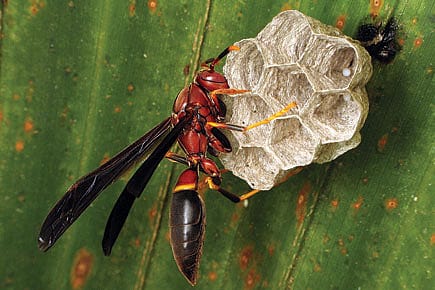Wasps and the Golden Rule

Altruism among these insects has an evolutionary motive: gene perpetuation
Why should nay organism sacrifice its self-interest to benefit others? In 1964, evolutionary scientist WD Hamilton proposed a formula to explain the phenomenon of altruism. The formula suggests that in genetic terms it pays an individual to help those who are closely related. This has been borne out by the study of social insects such as ants, wasps and bees. However, such behaviour in paper wasps, where unrelated wasps form a nest and help a dominant female lay eggs, has remained a puzzle. A paper published in Science by University of Sussex researchers has suggested an evolutionary explanation of why this happens.
According to a university release: 'The paper wasp sometimes rears its own young in a solitary nest, but often forms a social nest with other individuals, where one egg-laying female is dominant and the other wasps assist in rearing the offspring.'
The researchers found that 'unrelated subordinate wasps are more successful than lone wasps in producing offspring, because they can sometimes rise up the ranks and become the dominant, egg-laying female. For a paper wasp, therefore, 'selfless' effort in the nest of others could pay off in the longer term. If a wasp 'inherits' a nest, she will be able to lay her own eggs and have them reared by the nest's workforce. This does not happen in social insects such as honey bees, where subordinates (or 'workers') can never become queens…the results show that there is relative benefit for unrelated wasps to be in a social nest, because even though the chances that they will inherit the nest are low, if they are lucky enough to inherit they will produce many offspring. On average, any subordinate in a group will do better than any wasp that tries to breed alone.'
It's the Pits!
13 Feb 2026 - Vol 04 | Issue 58
The state of Indian cities
Lead researcher Jeremy Field says, "The behaviour of this primitive insect can therefore be explained by the importance of nest inheritance. Our study shows that paper wasp behaviour does fit in with evolutionary theory, but in a different way to other social insects."
